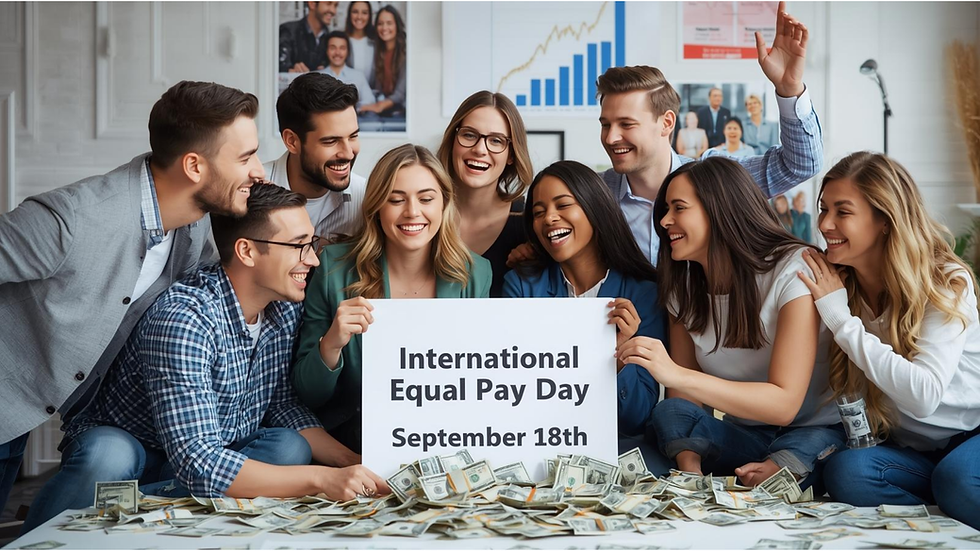Understanding International Equal Pay Day: Why It Matters for Gender Equality
- Sep 17, 2025
- 3 min read
Updated: Jan 9
International Equal Pay Day is an important reminder of the ongoing struggle for pay equity around the world. Observed each year, it brings attention to the gender pay gap and emphasizes the need for collective action to ensure that women receive the same pay for the same work as their male counterparts. The statistics are revealing: women globally earn about 20% less than men. This gap affects women's financial independence and has wide-ranging implications for workplace equality and economic stability.

The Origins of International Equal Pay Day
International Equal Pay Day was established by the United Nations to spotlight the gender pay gap and advocate for pay equity. It is observed on September 18th, which symbolizes how far into the year women must work to earn what men earned in the previous year. For example, this means that if a man earned $50,000 in 2022, a woman would need to work until September 18, 2023, to make the same amount.
The choice of this date serves as a stark reminder of the inequalities that persist in the workplace. The UN aims to inspire governments, organizations, and individuals to take decisive action toward achieving equal pay.
Understanding the Gender Pay Gap
The gender pay gap represents the difference in earnings between women and men in the workforce. According to the World Economic Forum, the global average salary for women is approximately 80% of what men earn. This gap can be attributed to various factors, including:
Occupational segregation: Women often work in lower-paying industries or positions.
Discrimination: Bias—both conscious and unconscious—can lead to unequal pay.
Experience and education: Differences in work experience and educational opportunities can also create pay discrepancies.
Despite progress, change is happening slowly. The World Economic Forum suggests that at the current rate, it will take over 135 years to close the global gender pay gap. This statistic highlights the urgency of addressing this issue and the need for ongoing efforts to promote women's rights in the workplace.
The Importance of Pay Equity
Achieving pay equity is about fairness, but its impact stretches far beyond that. When women are compensated fairly, they are more likely to support their families and communities. For instance, a McKinsey & Company report found that closing the gender pay gap could boost the global economy by $12 trillion by 2025.
Furthermore, pay equity fosters a diverse and inclusive workplace. Organizations that prioritize equal pay are more likely to attract and retain top talent, leading to better performance and innovation. For example, studies have shown that companies with more women in leadership roles often outperform their competitors.
Steps Towards Achieving Equal Pay
To work toward pay equity, various steps can be taken, including:
Raising Awareness: Organizations and individuals should engage in discussions about the gender pay gap and the importance of equal pay for equal work.
Implementing Transparent Pay Practices: Companies can adopt pay structures that make it clear how salaries are determined. Transparency helps identify and address pay disparities.
Conducting Pay Audits: Regular audits enable organizations to assess their pay practices and uncover discrepancies, allowing them to take action.
Supporting Women’s Career Advancement: Investing in mentorship and leadership training for women can empower them to take on more leadership roles, helping to close the wage gap.
Advocating for Policy Changes: Supporting legislation that promotes pay equity, such as initiatives for equal pay and family-friendly workplace policies, is essential for fostering a more equitable work environment.
The Role of Individuals in Promoting Equal Pay
While organizations play a crucial role in achieving pay equity, individuals can also contribute. Women should feel empowered to negotiate their salaries and seek opportunities for advancement.
Men can be allies by supporting their female colleagues and advocating for fair pay practices within their organizations. For example, men can mentor women and highlight the need for equitable pay in meetings, thereby amplifying the call for change.
Looking Forward: The Future of Equal Pay
The goal of achieving equal pay by 2025 seems ambitious yet necessary. As awareness continues to grow, it is essential that individuals, organizations, and governments work together for a more equitable future.
Remaining committed to pay equity is vital; it is a matter of justice and a fundamental human right. The responsibility to create change belongs to everyone.
A Call to Action and Reflection
International Equal Pay Day serves as important recognition of the work still required to attain gender pay equity. By understanding the significance of this day and actively pushing toward closing the gender pay gap, we can foster a just and equitable society for all.
As we observe this day, let's reflect on the progress made and the challenges ahead. Together, we can advocate for equal pay for equal work, ensuring that future generations of women can thrive in their careers.







